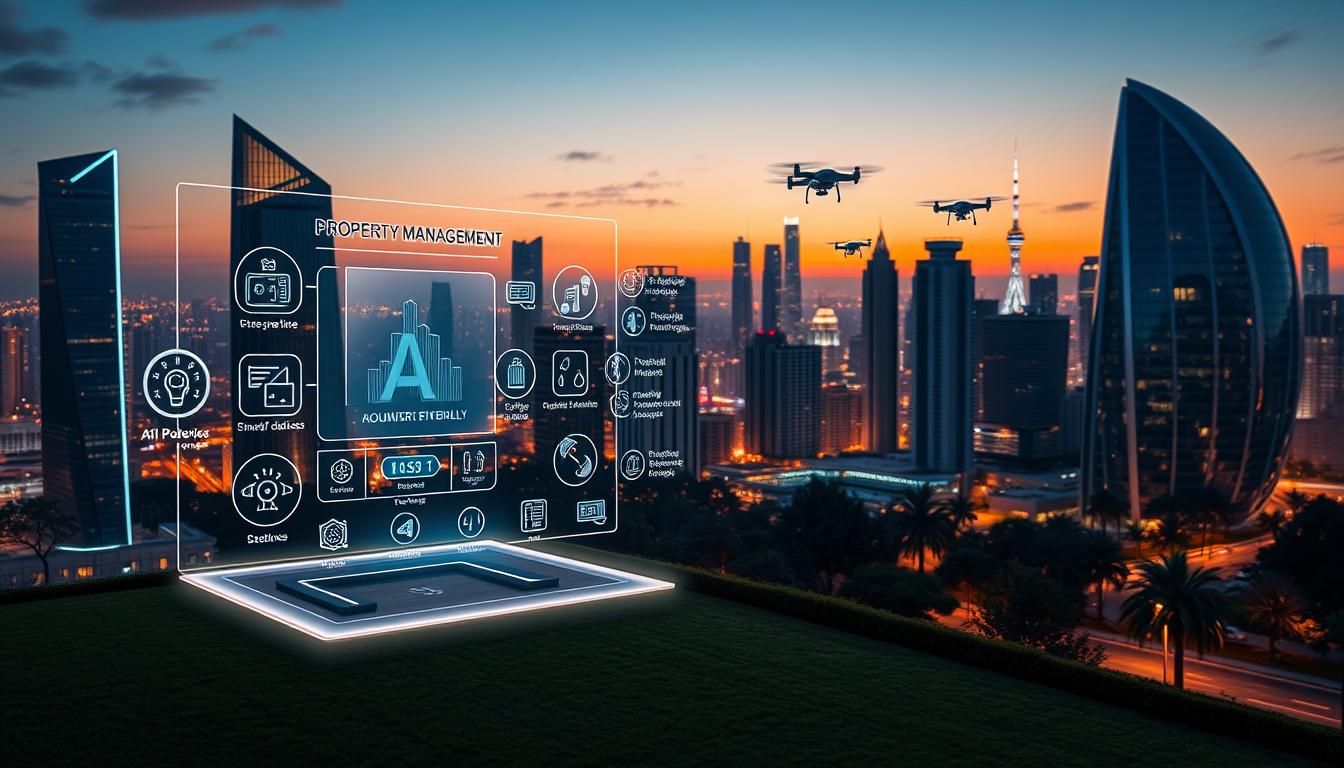Technology’s role in property management is expanding rapidly. Artificial Intelligence (AI) leads the charge, transforming operations. It automates tasks, enriches tenant communication, and boosts efficiency. Compliance tools help navigate changing regulations. Meanwhile, automation simplifies time-consuming duties, like tenant screening and upkeep. Through technology, managing properties becomes more efficient and tenant satisfaction improves. This ensures sustainable and effective property management.
Key Takeaways
- AI is fundamental in automating property management tasks and enhancing tenant relations.
- Compliance tools are essential for adhering to evolving regulations.
- Automation streamlines processes like tenant screening and maintenance management.
- The integration of technology in property management enhances operational efficiencies.
- Innovative property management strategies elevate tenant experiences.
The role of AI, compliance tools, and automation in real estate
AI is transforming real estate by improving tenant screening and enabling predictive maintenance. These technologies anticipate issues, keeping properties in excellent shape and cutting down on maintenance expenses. Automated rent collection also enhances financial management, simplifying payment tracking and financial projections.
Compliance tools significantly impact real estate, ensuring adherence to regulations and reducing the risk of penalties. These tools help property managers navigate complex legal requirements, offering confidence that they comply with all laws.
Automation enhances property management by allowing scalability and boosting efficiency. It automates routine tasks like tenant communications and lease management. This not only increases operational efficiency but also improves tenant satisfaction.
| Technology | Benefits |
|---|---|
| AI in property management | Effective tenant screening, predictive maintenance, financial management |
| Compliance tools | Adherence to regulations, reducing risks of penalties, avoiding financial losses |
| Automation in property management | Scalability, efficiency, focus on strategic initiatives |
Key benefits of integrating digital systems across operations
Integrating digital systems in real estate transforms property management, offering significant advantages. One key benefit is better decision-making through detailed data analysis. With new trends in property management, managers gain insights into tenant behaviors and space utilization. This approach leads to strategic and informed decisions.
Efficiency in property operations also sees a major boost. Through streamlined workflows, digital systems cut costs and enhance resource use. For example, automated billing and smart contracts lead to timely rent collection. They reduce errors, saving significant resources.
Rapid and personalized services improve tenant satisfaction. Predictive maintenance, informed by IoT devices, reduces costs and extends asset lifespan. Tenants appreciate quick issue resolutions, boosting satisfaction and retention.
Integrated systems also improve communication and marketing. Real estate data tailors marketing to tenant needs, ensuring responsive operations. This allows property managers to better engage with tenants, enhancing the landlord-tenant relationship.
The collective advancements underline the transformative power of adopting new trends in property management. From strategic decision-making and cost efficiency to enhanced tenant experience, digital systems are fundamental for future real estate management.
How to futureproof your property strategy starting now
In an evolving real estate landscape, adopting a futureproof property strategy is crucial for staying competitive. Technologies like AI for dynamic pricing adapt to market changes, enhancing profitability. Integrating sustainable property management practices attracts eco-conscious tenants and meets rising industry standards.
Robust data analytics provide deep insights into market trends and property performance. This knowledge allows property managers to make decisions that align with modern property management industry trends. Creating a tech-savvy brand is key to staying relevant and attracting tech-forward renters and investors.
Constant evaluation of your technology ensures your strategies stay innovative. Stay updated with new tech to maintain a competitive edge. By focusing on these strategies, you can secure lasting success in a competitive market.
Risks of falling behind in tech adoption
In property management, ignoring tech advancements poses serious issues. A major risk in property management is losing competitive edge. Proprieties bound to traditional methods often have slower response times. This makes them less attractive to tenants accustomed to technology.
Ignoring the evolution in property management practices leads to inefficiency. Without the latest tools, property managers face increased operational costs from manual tasks. Additionally, overlooking technology can hurt tenant satisfaction. Tech-enhanced services improve communication and living experiences.
Furthermore, staying compliant with regulations is tougher without modern tools. Overlooking this can trigger significant financial and legal problems. It highlights the need to use new technologies to remain compliant and competitive. Catch-up becomes difficult for those who delay embracing these advancements.
FAQ
Why is the future of property management driven by technology?
Technology is reshaping property management by enhancing efficiency, tenant relations, and maintenance. Innovations like AI, automation, and digital platforms allow for improved management. They support predictive maintenance and streamline tenant screening, elevating the overall property management experience.
What roles do AI, compliance tools, and automation play in real estate?
In real estate, AI facilitates swift tenant screening, predictive maintenance, and efficient financial management. This includes automation of rent collection and financial predictions. Compliance tools ensure adherence to the latest regulations, minimizing risk. Automation simplifies many operations, boosting efficiency and enhancing the tenant experience by making communications and tasks more manageable.
What are the key benefits of integrating digital systems across property management operations?
Digital systems enhance strategic decision-making through in-depth data analysis. They reduce costs through operational efficiencies and improve tenant satisfaction with faster, customized services. The use of IoT devices supports predictive maintenance strategies. This extends the life of assets while cutting unnecessary costs, improving communication, and boosting marketing.
How can property managers futureproof their property strategy?
To futureproof, managers should embrace technologies that align with foreseeable trends and shifts. Utilizing AI for price adjustment, adopting sustainable methods for eco-friendly tenants, and using thorough data analytics for insights are key. Establishing a technology-oriented brand, staying abreast of tech developments, and regularly assessing the impact of these technologies are crucial steps.
What are the risks of falling behind in tech adoption in property management?
Delaying tech adoption risks losing competitive edge, operational inefficiency, higher costs, and less tenant satisfaction. Properties that are slow to respond may struggle to attract modern tenants. Moreover, neglecting tech-supported regulatory compliance could lead to significant financial and legal issues.
Can you give examples of innovative property teams already leading the way?
Innovative teams utilize AI for better tenant interactions, commit to sustainability, and apply data analytics for sound financial and market strategies. They also employ predictive analytics and AI for customer service. Their efforts in personalizing communication and leveraging data for customized services help maintain high tenant contentment and loyalty.






